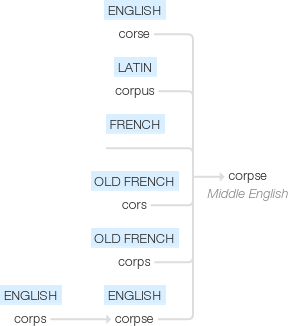Corpse
Middle English (denoting the living body of a person or animal): alteration of corse by association with Latin corpus, a change which also took place in French (Old French cors becoming corps ). The p was originally silent, as in French; the final e was rare before the 19th century, but now distinguishes corpse from corps .
wiktionary
From earlier corse, from Old French cors, from Latin corpus(“body”). Displaced native Old English līċ (whence modern English word lich). The ⟨p⟩ was inserted due to the original Latin spelling. Doublet of corps and corpus. The verb sense derives from the notion of being unable to control laughter while playing a dead body.
etymonline
corpse (n.)
late 13c., cors "body," from Old French cors "body; person; corpse; life" (9c.), from Latin corpus "body" (from PIE root *kwrep- "body, form, appearance"). The order of appearance of senses in English is "dead body" (13c.), "live body" (14c.); it also meant "body of citizens" (15c.), "band of knights" (mid-15c.), paralleling the sense evolution in French that yielded the doublet corps.
French restored the Latin -p- in 14c., and English followed 15c., but the pronunciation remained "corse" at first (and perhaps remains so with some speakers) and corse persisted as a parallel spelling. After the -p- began to be sounded (16c. in English), corse became archaic or poetic only. The terminal -e was rare before 19c.
Corpse-candle "candle used at ceremonial watchings of a corpse before burial," is attested from 1690s.
